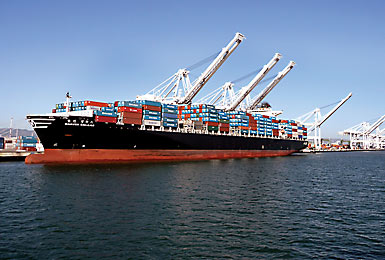The Area Development Frontline series offers insight into the innovative strategy being taken by businesses that are succeeding, intelligence on locations that are deploying winning policy to attract investment and talent, and reports on the industry trends that are affecting and shaping the global business climate now and into the future.
Ports around the world eagerly await the completion of the Panama Canal expansion in 2014 for the financial boost they hope it will lend their locales. At three Gulf of Mexico and inland ports and waterways - Gulfport, Mississippi; Mobile, Alabama; and the Tennessee-Tombigbee Waterway - local port authorities have signed memoranda of understanding (MOU) with the Panama Canal Authority to encourage increased traffic in the Gulf.Mississippi State Port Authority
Since Hurricane Katrina severely damaged the Port of Gulfport in 2005, the Mississippi State Port Authority (MSPA) has worked to expand the state's primary Gulf port. Part of that effort is the MOU MSPA signed with the Panama Canal in August to generate new business and jobs.
"We're a global seaport and we're making dramatic leaps in trying to develop closer ties with institutions like the Panama Canal Authority," says MSPA Executive Director and CEO Donald R. Allee.
The MOU targets communication, information exchange, and joint marketing activities to benefit both entities. Mississippi will benefit from the Panama Canal expansion itself, as it will "create opportunities for ports in this region to compete with one another for additional business that is predicted to result from an expanded canal," Allee says.
The Gulfport expansion will also benefit from the serendipitous timing of Panama's expansion. Gulfport, the third busiest container port in the Gulf, is increasing its capacity to compete with neighboring ports in Houston and New Orleans to target the increased traffic the canal expansion could bring.
Alabama State Port Authority and Tennessee-Tombigbee Waterway
The Alabama State Port Authority (ASPA) expects its MOU to grow traffic and services.
"The biggest area where we see potential is in the container sector," says James Lyons, ASPA executive director and CEO. "What we see there is that the Gulf and Atlantic ports will likely gain market share in Asian trade."
While Lyons is optimistic about the MOU's outcome, he is also realistic about the scale of growth the agreement and the Canal expansion will entail. Logistics services from the Canal to the Gulf will become more reliable. The expansion will also allow larger vessels carrying up to 13,000 TEUs and bigger economies of scale to enter the Gulf.
"Beyond that, we'll see the market shift off the West Coast," Lyons says. "It's going to be in percentages and not 100 percent growth, [about] 10-15 percent."
The agreement could also spur regional economic development. "Ports make a huge difference when a site selector is recommending a site if they have an international transportation need," Lyons says.
If Gulf traffic increases, inland waterways could see a corresponding spike. The Tennessee-Tombigbee Waterway begins in Tennessee, traverses Mississippi, and ends in Demopolis, Alabama. Waterway Administrator Mike Tagert says the MOU signifies that the Panama Canal Authority recognizes the inland waterway system as an important component of the all-water route between Asia and Europe.
While no one can predict with certainty the Canal expansion's results, Tagert says increased activity at the Port of Mobile will popularize inland waterways and ultimately strengthen economic development along the Tennessee-Tombigbee.
"More volume and utilization makes that that much more attractive for future development," Tagert says. "We have unlimited capacity. That's worth noting."



